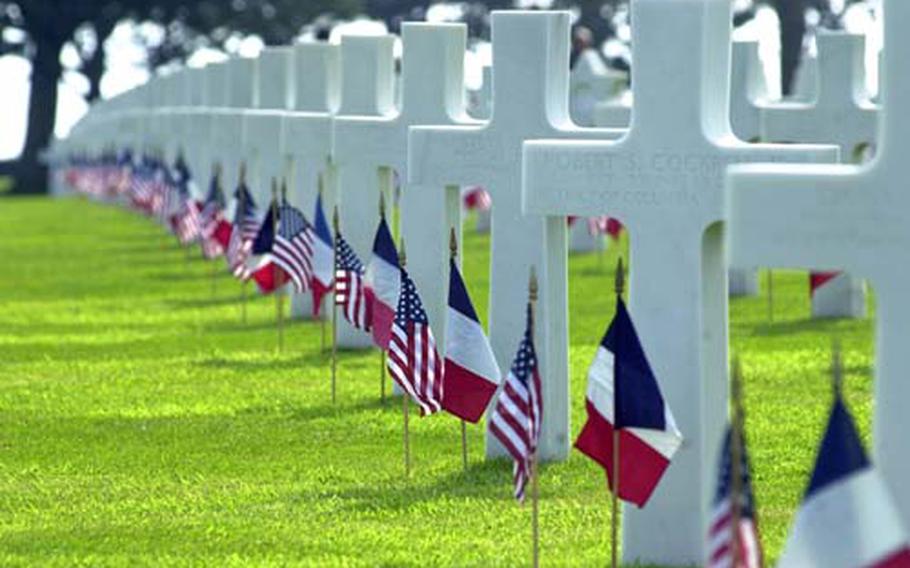
American and French flags decorate rows upon rows of American graves at the Normandy American Cemetery at Colleville-sur-Mer, France. The cemetery will host the main U.S. ceremony commemorating the 65th anniversary of D-Day at 2:30 p.m. on June 6. President Barack Obama is scheduled to attend. (Michael Abrams/ Stars and Stripes)
The ranks of living D-Day veterans have long been thinning.
As the 65th anniversary of the World War II Allied invasion of Europe approaches, even the youngest men who survived the bloody beach assaults, night parachute drops and glider landings into northeast coastal France now find themselves in their 80s.
Normandy American Cemetery Superintendent Daniel Neese said he has heard more than 100 D-Day veterans will attend this year’s anniversary.
Given the veterans’ ages and the associated physical hardships of traveling to France, this year’s event is "very important," Neese said.
"To me, it’s the last moment we may be able to pay honor to these gutsy, confident, courageous men — in person — who sacrificed and prevailed on the 6th of June 1944 and also during the Normandy campaign," he said.
The National World War II Museum in New Orleans estimates that there were probably 500,000 U.S. personnel on or just off the beaches at Normandy and who could be called D-Day vets. Of those, roughly 62,500 are still alive, according to Kacey Hill, a spokeswoman with the museum.
President Barack Obama and French President Nicolas Sarkozy will attend ceremonies at Normandy American Cemetery in Coleville-Sur-Mer, France, various media outlets have reported.
Others agree this will be a significant D-Day remembrance.
"This is really their last big trip," said amateur historian and Landstuhl Regional Medical Center nurse Ann Shields.
Hal Baumgarten, who wrote "Eyewitness on Omaha Beach," said he is going to be there, Shields said.
"Some of the others now are not going to be able to make that trip," she said.
Baumgarten, 84, was wounded three times on D-Day and twice the day after, including an upper jaw shattered by shrapnel and a gunshot wound to his knee when he was on a stretcher. His account of the amphibious landing at Omaha Beach formed the opening scene of "Saving Private Ryan."
On D-Day, Baumgarten was a 19-year-old private with Company B, 1st Battalion, 116th Infantry Regiment, 29th Infantry Division. He was one of two soldiers out of 30 from his landing craft to survive the day. The other survivor died of a heart attack last year, Baumgarten said.
Baumgarten has made the trek to Normandy for the D-Day anniversary every year since 1988, he said. This year, he’s coming with some guys from the 29th Infantry Division or "what’s left of them," Baumgarten said by phone from his home in Jacksonville Beach, Fla.
The author, who has appeared on numerous D-Day television specials, understands the importance of the 65th anniversary. His upcoming trip to Normandy could be his last, he said.
"I don’t think I’m going to go back again," he said. "I think I’ve had it. I’m having trouble with my leg.
"It’s very meaningful to me because a lot of the guys lost their lives there. I go to the graves. I go to my lieutenant’s grave. [Tom] Brokaw put me on TV saluting my lieutenant’s grave."
Yet, Baumgarten said he might change his mind.
"I keep telling my wife I won’t make it back after this year, but I’ve been saying that every year," he said.
Irving Smolens is one veteran who participated in the D-Day landings and the subsequent campaign across Europe who will not be making the trip to France this year. The former soldier with Battery B, 29th Field Artillery Battalion, 4th Infantry Division was in Normandy for the 50th and 60th anniversaries.
Smolens can recite the line from President Bill Clinton’s speech that drew rousing applause at the 50th anniversary.
"They may walk with a little less spring in their step and their ranks are growing thinner, but let us never forget when they were young, these men saved the world," Smolens said, quoting Clinton’s 1994 speech at the Normandy American Cemetery.
For the 60th anniversary, Smolens led the 21-gun artillery salute at both Omaha and Utah beaches by dropping his hand to signal the soldiers when to fire.
He considered making the trip for the 65th anniversary, but things didn’t work out, he said by phone from his home outside Boston. He will be in Virginia at that time, where he’ll be interviewed for a Library of Congress project.
In five years, Smolens hopes to be in Normandy for the next big anniversary, and if asked, he’ll be willing to lead the 21-gun salutes again.
"I’m 84 years old," Smolens said. "I’m holding out till I’m 89 so I can go to the 70th…. I would be glad to do it. I should only live so long."